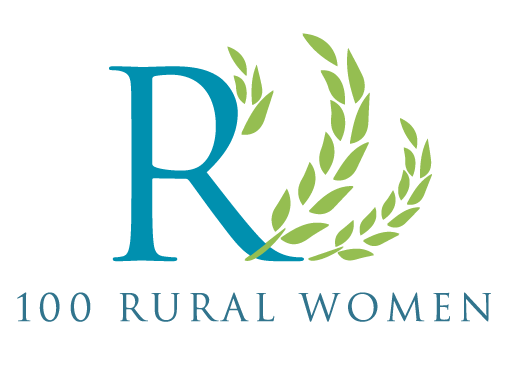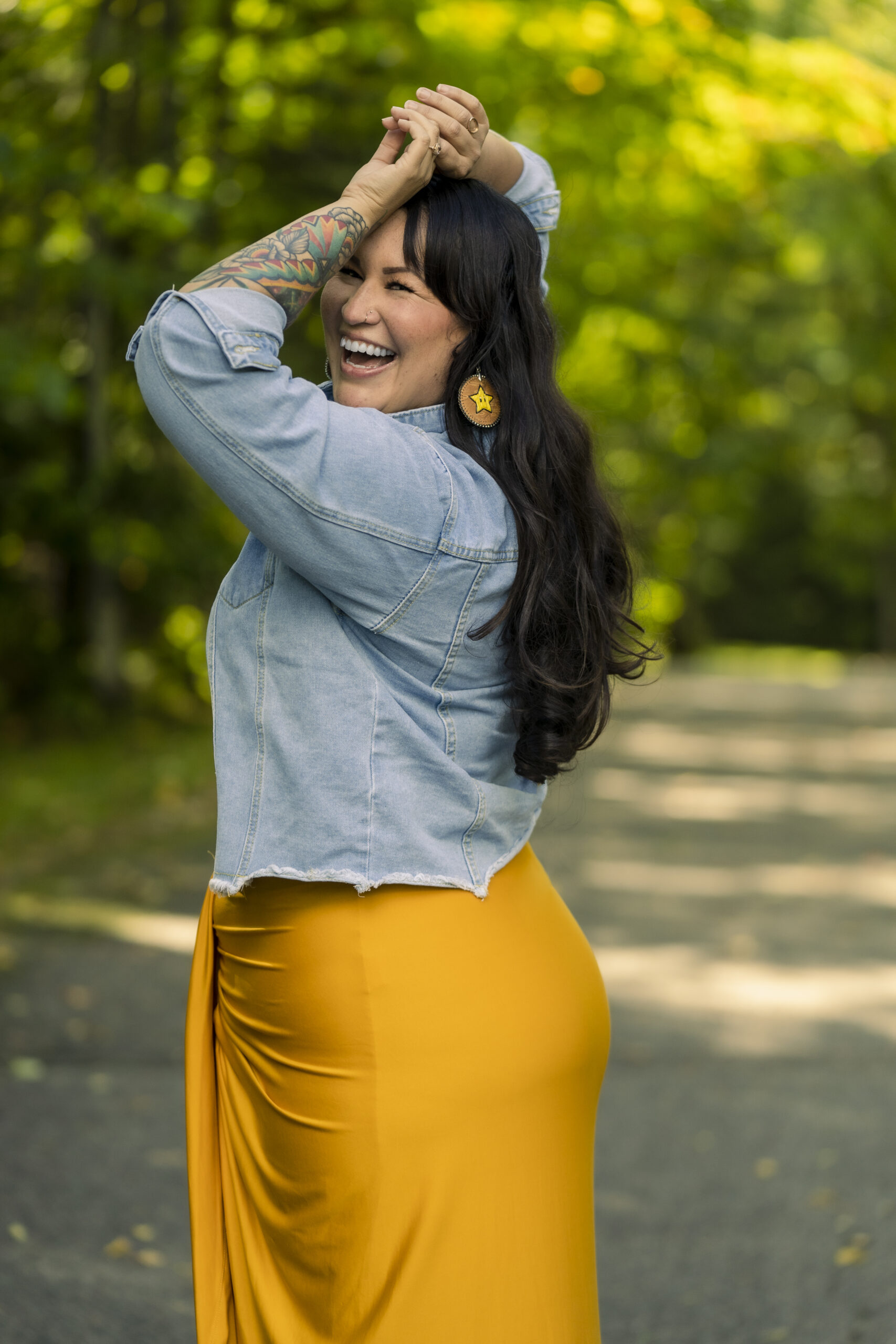“When I was younger, I used to say I’m going to change the world. Now I don’t aim to change the world, I aim to change the space that I’m in.”
Fawn Sampson is one of our board members here at 100 Rural Women. She works for the University of Minnesota-Extension as an educator. Born & raised in Leech Lake Nation, Fawn has a special interest in working with tribal nations. She is based in Grand Rapids and has lived in the northern region of the state for most of her life. She is a mother to two young boys and married to her best friend, an artist and performer.
We are so fortunate to have Fawn on our board at 100 Rural Women. We’re excited for our community to get to know one of the incredible women making the decisions for our organization.
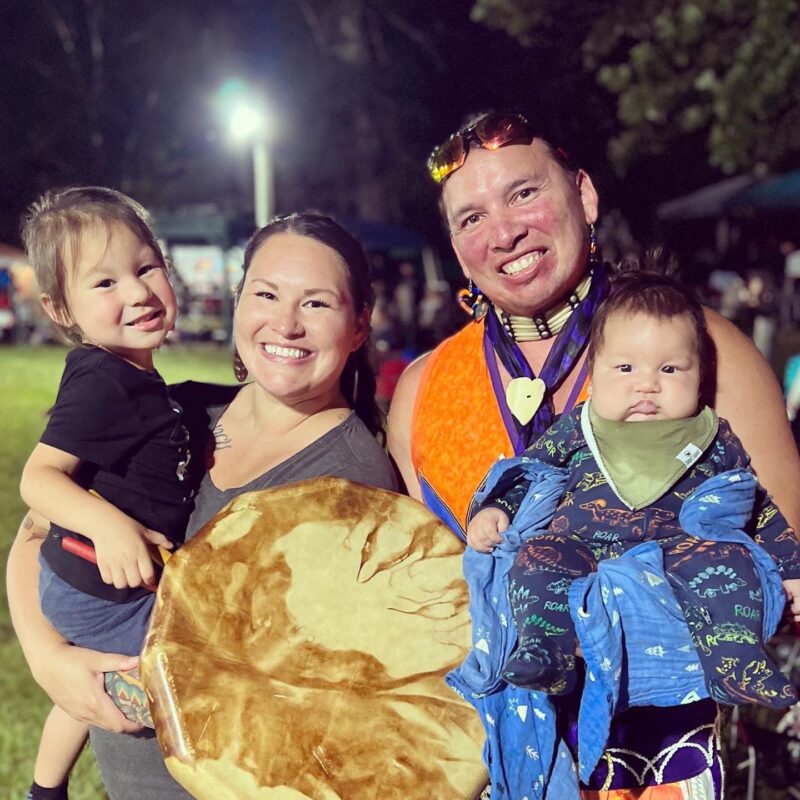
Before we dive into professional life, tell us a bit about your life outside of work
My real passion is art. I like taking pictures. I do a lot of charcoal drawings, a little bit of painting, photography, a little bit of everything I guess you could say. My husband and I are both artists, so we team up a lot and do projects together. We have traveled together a lot! He’s my best friend and we’re excited to share that with our kids too… I also have two little boys who keep me super busy. My son is only four and he’s been to almost 15 states.
What is your connection to rural America?
I was born and raised in rural America. I lived in an urban space for six years, but I moved back and bought a house in rural in 2021. I’ve mostly lived on tribal lands and then as I got older into my professional career, I’ve done a lot more work within rural communities. My work in extension is mostly with rural communities and organizations.
What drew you to the 100 Rural Women board of directors?
I don’t know how Teresa found me, but she came and asked me to join. I thought it would be really awesome. There are a lot of tribal communities in rural, so I thought that I could be a good voice to bring up that piece into 100 Rural Women.
Why do you think community in rural spaces is important?
I shared space with urban communities too and because there are so many people in such a small space that just feels like there are always people around. When you come to rural, you really have to feel comfortable with being alone or isolated a lot of the time. So, communities being connected is such a huge part of our rural spaces. Our Tribal Communities are connected through community and that’s really the essence of who we are. It’s built into our value system.
What has your path been from education to career?
My bachelor’s degree is from Bemidji State University, and I have a Master’s in Education from the University of Minnesota-Duluth. At Bemidji, I double majored in American Indian studies and Visual Arts with an emphasis on Jewelry & Metals.
I just recently graduated. It took me a while to get through my master’s degree. I moved away, then had kids, and wrapped that up within the last year. I’m a hard-working mom and I went to school full-time pretty much the whole time since I’ve had my kids. So that was a huge accomplishment and made me feel so much better to get that off my back.
Ever since I was 18, I’ve been working 40 hours a week. I worked for many years for our gaming casinos as I went to school. It was the most flexible schedule that I had. My job history… most of my professional work comes from working within higher ed. I worked for Leech Lake Tribal College running their print shop.
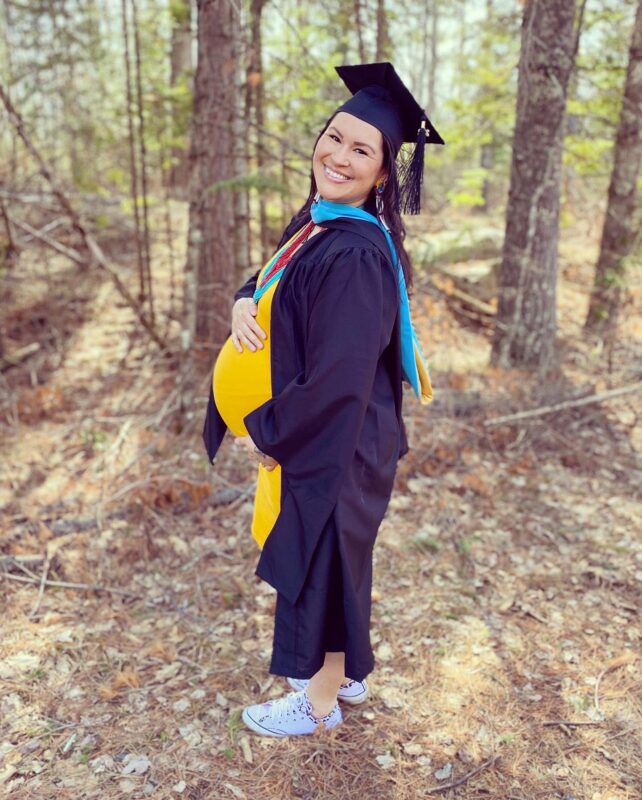
I also worked for the University of Minnesota-Twin Cities for the Department of American studies for a couple of years. Then I worked for the University of Illinois at Chicago as a tour coordinator and an admissions counselor, supervising about 70 students there. That was one of my fun jobs and those jobs were a lot of my urban life.
I was also a STEM coordinator which is funny because I’m not a math/economics/science person. I did a lot of work around economics in the last couple of years. We won three different awards, one regional and two national, for our work in Indian country– which is pretty awesome!
That’s incredible! Can you tell us about the work that you got awarded for?
Our work was in building economic capacity in Indian countries. Our team laid the groundwork for what we’re going to continue to do in extension. We really are pushing indigenous voices to the forefront of the work and making sure that we are taking a lot of care in how we communicate and work within tribal communities.
What direction do you hope to take your work in the future?
My work has really been grounded in upholding traditional values and making sure that we are reciprocating the learning experience because we do learn a lot from our Tribal Community. I just moved into this educator role so I’m kind of switching gears. I’ll be able to do a lot more scholarship and create leadership programming. There’s a lot of work that I want to do around indigenous leadership. I think I’m going to have to create a lot of it because there’s not a lot. Indigenous is really focused on economics and capacity building in that way.
At least the first 18/19/20 years of my life I didn’t really know anything about the history and how America was here, so I didn’t get to learn the hard stuff until college. It’s like walking in between two worlds and someday I would wish for that line to kind of be blurred more. I think through my work in Extension I want to be able to blur that line. I want it to be where we’re just automatically bringing in tribal voices or marginalized communities. We need to be bringing those extra chairs to the table instead of people bringing their own chairs. Because I’m tired of carrying my own chair.
How do you feel your background, family, community, and education have impacted how you view yourself?
You can have a good idea of who you are as a person, you can hype yourself and stand in front of the mirror doing your superhero pose saying “I’m good. I am beautiful. I’m awesome. I am smart.” And then you step out the door into the real world and you have all of these influences around you that kind of chip away at that confidence.
I really feel that our individual leadership really needs to start at home and within ourselves and that’s really taken care of inside first. Sometimes that’s not an easy task for a lot of people. Especially in marginalized communities. We have a lot on our shoulders taking care of each other. Some people jump right from high school to taking care of brothers, sisters, aunties, uncles, cousins, families, and this family system while they’re young. Who gets a chance to just stop and think “I’m loving myself”?
When I grew up, I would say through high school, I really put community first. I was making sure that I was always educating about who/where I come from, breaking down stereotypes, and trying to share information in a positive way. I didn’t really know who I was until I went to college and then I started learning a lot about our history. Because they don’t teach our history in high school or grade school. In college I had to learn a lot of the dark history and I remember leaving my classrooms in tears and feeling so lost.
I kind of went through this transformation in college and really figured out who I was internally and why I’m here today. I was learning a lot about myself and the history and my ancestors and people.
What are some challenges in your field of work?
Sometimes working in this professional realm is really hard mentally. You get pulled in so many directions and sometimes people want you to have the answer for everything. I’ve learned over time that I can say “No, I don’t know.” or “I can’t be this person for you.” Because I don’t have the answers to everything.
How did you come to this role of leadership?
People don’t go to school and be like “I’m going to be a leader” you know what I mean? People get scared of being a leader, but I really want to come back to that personal and individual leadership and how we see ourselves. Not just in our own minds but also within our family systems, in our communities, and even broader.
You know, I was just looking into old yearbooks, and I came across my quote that said, “I’m going to go to school and get my master’s degree and be a psychologist.” Well, I accomplished my master’s degree but I’m not going to be a psychologist. I somehow just landed into this position where I currently am working around leadership and civic engagement. I really try to pull from my experience, my journey, and listening to others.
How do you lead change in your community?
I speak from my heart almost all the time. I’m not afraid to challenge or question things and I try to do it in a way that makes us think rather than shaming and blaming. We spend a lot of time in our worlds shaming and blaming each other.
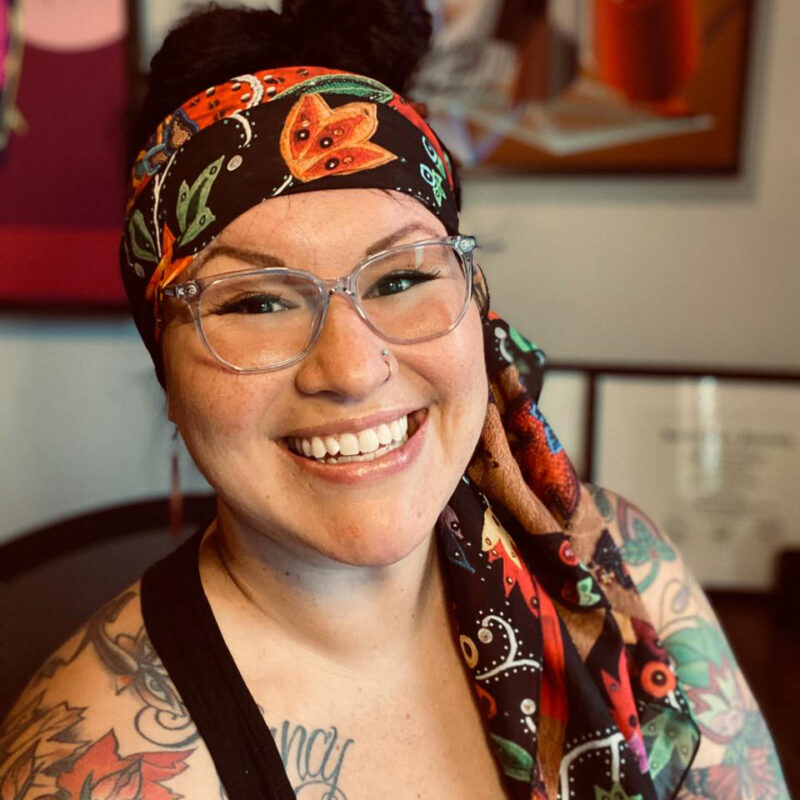
I’m trying to make a better world for my kids and their peers. As indigenous people, we always think seven generations ahead and seven generations behind. So, we’re always thinking about how we can make the world a better place for the next seven generations. If you think of that timeline, that’s a really long time. That’s just the core of who we are. We hear that phrase a lot when we’re younger. It’s built into our language and everyday living.
If you’re honoring those seven generations that came before you, you’re honoring those ancestors and those people. They’re why you even exist today. So, if you think about how different your life would be if you were to think about the next seven generations, you become real selfless and a lot of giving and you really learn to open up your heart and sometimes that’s not an easy task but keep pushing through.
I’ve done a lot of talks being in extension. I’ve also done a lot of connecting and networking as I was previously a liaison.
Links
Minnesota Indigenous Leadership Network
What led you back to rural?
There was a point in time when I went away because I didn’t want to be in northern Minnesota anymore. I think that everybody needs to go away at some point. Home will always be here. Right? I was young and in my 20s and I was like just exploring and learning new things about the world around me. Now I know that nothing is more beautiful than home to me. This is where my family has been for hundreds of years and there are so many different beautiful things about our culture and the people in our communities and how we take care of each other. It just really inspires me every day to keep going.
Who or what has been your biggest inspiration?
I always say that I’m not going to get emotional. I’m really passionate about what I do. I always hold Tribal Communities to the forefront of my work because that’s where I came from.
So, my biggest inspiration is just my communities honestly…and my grandparents and family!
There’s clearly an issue with a lack of awareness and education on indigenous cultures. What has been your experience with this?
Yeah, I mean adults need to do better. Obviously. We’ve learned, especially through the last few years, how well and alive racism is. We are identifying white privilege and what that actually means.
I’ve had to spend my entire life trying not to be offended by everything that people say. When I was in high school, I had people ask me some bizarre questions. One time, there was a white girl from rural Minnesota, and she was like “you’re a Native American?” and I’m like “yeah…” she’s like “Do you live in a teepee? Do you have running water and electricity on the reservation?” I’m like “what?! I didn’t show up in my butt flaps.” You know! I always joke about the butt flap because when you see Indians in the media, they always have loincloths and things like that. I know what it was like growing up in a Tribal Community with the stereotypes
and the racism and how I felt and being like “that’s not me, that’s not me.” So, I’ve spent most of my life answering questions like that.
I spent years in college listening, reading, and visiting with people. There are over 500, almost 600 registered federally recognized tribes. That’s not to mention the non-recognized tribes, which means that there are over thousands of different cultures and languages just within the United States. Everybody has Google at the tip of their fingertips.
I’m not the same person I was 20 years ago. I could say that I was ignorant coming from rural Minnesota, and I’ve learned a lot over the years. I had some growing pains throughout those years but if we work together to continue educating and lifting up marginalized voices, I think there will be a point, maybe not in my lifetime, when they will be pushed to the forefront of the conversations most of the time.
Can you tell us about a time that you felt discouraged in how you pushed through that?
oh man, I think mentally I’m discouraged a lot. Only in the professional world because imposter syndrome is hard. It’s heavy. I’m constantly feeling like I’m walking in a space that was not made for me and always carrying my chair around. Carrying my chair around with me, my arms are tired. Every conversation I’m having to be like, “Hey, I’m over here!”
Walking in this professional world of academia, I’m starting to realize… I didn’t realize before that I wasn’t privileged. Growing up on the reservation, having my family, and having my culture, I felt really privileged to be able to have access to that. Then I got to college and was like wow, we couldn’t even practice ceremony in public until after the 70s. Women were able to vote before Native Americans were even considered citizens. We were the first people in this area! To think that I wasn’t a citizen, or my grandparents weren’t citizens at one point just blows my mind.
I can’t think of one time but there are a lot of moments like that, and I think most times it’s exhausting. Sometimes I think, can I just play in my garden that I’m growing and be an artist full time? I’d rather do that. Can you just pay me to exist?
This just comes in waves and moments. How I overcome it is by remembering that it’s going to get better because more people are listening. People are trying. I see that people are trying.
It’s not always going to be easy and it’s not fun to challenge or question. Those who have negative things to say are always the loudest. People get uncomfortable and I have to remind them, I’m not here to make you uncomfortable but I want us to be uncomfortable with our colonized practices and how we set our way on just being white male all the time. That’s even for all women that have been marginalized too, right?
So, it’s a lot of mental discouragement in a lot of ways. But there are moments that make it worth it too. Like when I get messages saying, “You know, you really changed my mind.” or “You changed my life.” Or “you saved my life.” I’ve been told that many times throughout the years and it makes it worth it.
I get really passionate about the work that I do, and I get really passionate about my viewpoints and especially around leadership and that’s how I overcome those hardships is knowing that I am in a place to make a difference and how I shape that and how I do that it’s really going to lay the groundwork for others to come forward and walk alongside me.
I always say, “don’t try to change the world, try to change the world that you’re in.” If I can make one person think differently or just plant those seeds, I’m winning. That’s a win in my book.
If you could give a piece of advice to your former self, what would it be and why?
Explore. Just take those adventures before you feel like you need to have a house and a family and a home. I feel that being in rural America we see a lot of the family structures and what we strive to have right away after high school. Get married, start a family, and it’s all these things all at once. I tried that. That didn’t work out for me.
I wish that I just continued traveling more in early in my 20s. I wanted to travel so much, and I did a lot of that in my late 20s and early 30s before I had kids and those are some of my favorite memories.
With the exception of a few, I have traveled to almost every state. I’ve met so many amazing people on my journey. There have been internships and lots of conferences. I’ve taken “Yes trips” where I’m like “yeah I’ll go!” Not knowing where I was staying or what I was doing. Haha… so travel!
I just grew into a different human being. I didn’t know who I was and being able to leave and explore helped me so much. My education has taken me places that I never knew I would go.
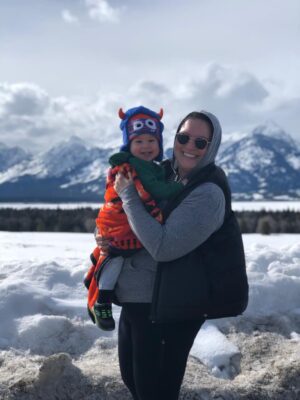
I wish that we people, especially Tribal Communities, spent time away from home. Working in higher education I knew that native students were going to go home. I could tell because it’s just who we are as our community, and we really miss home when we’re gone. We really miss that closeness and it’s hard to find a community in schools. I was a non-traditional student, so I didn’t have the experience of living in the dorms or being really connected to a community, or really doing super fun college stuff because I was already trying to be an adult.
See things that are not within your radius of home because you really appreciate how small you really are. That sounds weird but it’s true. It makes you feel insignificant. If you’re to look up at the stars, you feel really tiny, but it makes things less scary or less pressuring. It reminds me like okay I’m only one tiny little human being in this grand scheme of things and I can only do so much. It’s relieving. Because when I was younger, I was like “I’m going to change the world.” Now I don’t aim to change the world, I aim to change the space that I’m in.

